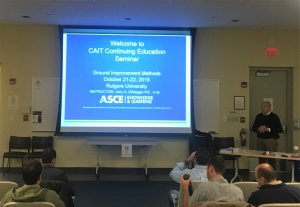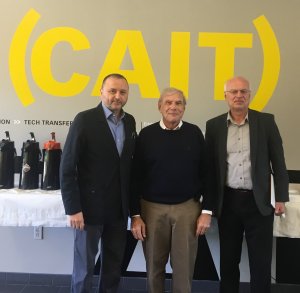
Jerry DiMaggio taught professional engineers about 50 different ground improvement methods during a 2-day course at Rutgers CAIT. Photo ©Ryan Stiesi.
On Oct. 21 and Oct. 22, Rutgers CAIT hosted A Training Course on Ground Improvement Methods that outlined the best practices for dealing with poor ground conditions at the job site. Professional engineers came to campus for the two-day event to learn about these emerging technologies from an experienced guest instructor and to earn PDH credits.
Difficult ground conditions call for alternative work methods in order to complete a project, but bypassing poor soil by moving the project to a better site, removing and replacing unsuitable soils, and other solutions can be costly and inefficient.
Today, there are new methods, tools, and techniques that can be used to meet these demanding project needs in a more efficient manner, and for two days in October the Rutgers Center for Advanced Infrastructure and Transportation (CAIT) hosted a training course to inform and familiarize engineers with these emerging infrastructure solutions.
A Training Course on Ground Improvement Methods took place at CAIT on Oct. 21 and Oct 22, and was taught by Jerry A. DiMaggio, PE, D.GE, a Senior Principal Civil Engineer and Associate at Applied Research Associates, Inc.
The course took students through more than 50 different ground improvement methods by its end. It also demonstrated how to use these methods in urban construction for transportation, commercial, and industrial development.
Fernando Bermudez Jr, PE, a Staff Services Engineer in the Engineering/Architecture Design Division at The Port Authority of New York and New Jersey attended the class.

(Left to Right) CAIT Director Dr. Ali Maher joins Jerry DiMaggio and Dr. Nenad Gucunski, professor and chair of the Department of Civil and Environmental Engineering at Rutgers, outside of the class. Photo ©Ryan Stiesi.
“The course was clearly presented and provided applicable insight on different types of Ground improvement methods,” he said.
Modern ground improvement technologies can help improve marginal sites to meet demanding project requirements—saving time and money. During the course, DiMaggio defined ground modification and reviewed the modern tools and techniques needed to accomplish these objectives such as mechanically stabilized earth walls and reinforced soil slopes, prefabricated vertical drains, soil nailing, dynamic and vibro compaction, and more.
“Having presented approximately 400 continuing education courses during my career I look toward the venue and the participant backgrounds and their engagement as personal satisfying outcomes for me,” DiMaggio said.
As a Senior Principal Civil Engineer and Associate at Applied Research Associates, Inc., DiMaggio works in the Research and Technology Deployment group. He specializes in civil engineering and construction services related to design and construction, strategic planning, innovation deployment and implementation, and business plan development.
He is a certified Diplomat of Geotechnical Engineering by The American Society of Civil Engineers (ASCE) and a certified Master Trainer, who frequently serves as a workshop facilitator as well as having presented hundreds of seminars and courses.
“The recent Ground Improvement course sponsored by Rutgers CAIT exceeded my expectations,” he said. “I sincerely look forward to a future opportunity at CAIT to present another course on important and emerging infrastructure topics.”

